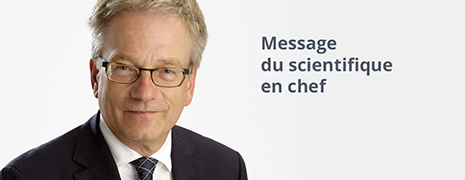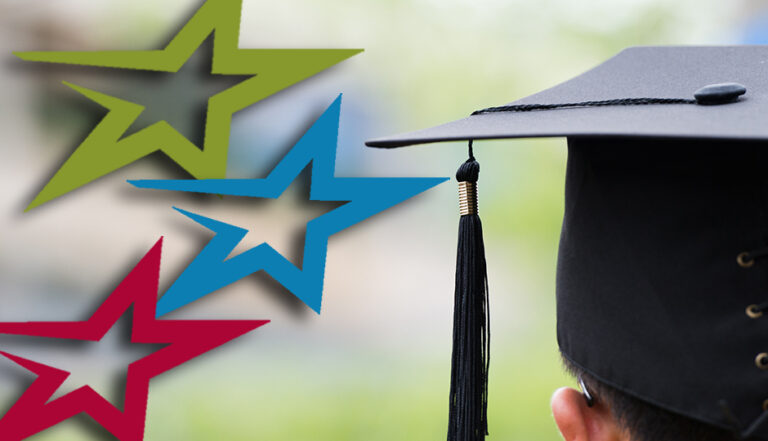I would like to extend my best wishes for health to each and every one of you! In 2021, I am looking forward to great successes and perhaps even a respite from the tests we've faced in recent months. I hope that research, science and COVID-19 vaccines will soon reunite us, in person, with our families, friends and colleagues.
There is no doubt that 2020 was difficult for every member of our scientific research community. We at the Fonds de recherche du Québec (FRQ) are very much aware of this. Indeed, that is why we have decided to extend the funding periods of a number of programs (groups, centres, networks, institutes and awards) to support our researchers and students in the challenges brought about by the pandemic. We are also offering some flexibility in terms of the submission deadlines of scientific and administrative reports.
We recognize that, in many cases, the impacts of the pandemic will be felt not in the coming months but in the coming years, and we will consider them when reviewing the applications to our competitions. I would like to point out the quality and strong resilience of our staff in Québec and Montréal. We have all been working from home since March and found ways to adapt, even in these adverse conditions, for example when all our peer committee meetings went virtual. The pandemic has taught us a great deal, and I would like to thank all of you for your high standard of excellence.
Science for citizens and governments
Science has never been as present in our lives as it has been during this pandemic. It is now an everyday topic in all communications, from government press conferences to traditional and electronic media. As researchers, many of you have been very active in the public sphere, and our fellow citizens truly appreciate your work. I would like to take this opportunity to thank you for your ready availability to collaborate with media outlets and make appearances in the media and on social media to explain and comment different facets of the pandemic based on your expertise in your research field. Along with your status as researchers comes significant responsibility because people trust science and the scientific community. Your presence in the public sphere provides some counterweight to the disinformation and conspiracy theories that the current situation has exacerbated.
To ensure you remain prominent in the media even once we have overcome the pandemic, we must enhance our programs, including Dialogue, to better recognize and highlight your public contributions. We must also place greater emphasis on open science and participative research to ensure all our fellow citizens better grasp the scientific method and broaden our understanding of disinformation by implementing forward-thinking projects involving the population. All suggestions are welcome!
In the same way, science is more present than ever in Québec's government departments and agencies. This new awareness has led to the development of several partnerships between the FRQ and various ministries. In addition, thanks to the concerted efforts of our three boards of directors, the members of the FRQ's senior leadership teams and the Ministère de l'Économie et de l'Innovation including the Minister, science and research were recognized as key drivers of the economic recovery. As part of Minister Girard's economic update last November, the FRQ received an additional amount of $50M ($10M in 2020–2021 and $40M in 2021–2022) that will enable us to better support our award holders in all sectors, as well as implement research initiatives in leading areas such as education, agri-food, clean energy, aging and mental health, circular economy and cybersecurity. Further details will be released soon.
For the FRQ, advancing science and research goes hand in hand with their dissemination in French. In this regard, we will be launching a monthly competition this quarter to recognize a French-language scientific publication in each of our three research sectors. We believe in promoting and broadening the reach of French scientific publications based on the work and expertise of the members of our research community.
Among the major challenges of this new year and the coming years is making sure science and research remain priorities for our governments and are deemed essential to the economic recovery and development of a more equitable society. We are working diligently to this end, and our success depends on each and every one of you lending a hand. We are well positioned to achieve our goal through our collaborations with influential partners in every sector of our society.
Government strategies and the FRQ's strategic plans
In 2021, the office of the chief scientist and FRQ will contribute to a number of government priorities and issues, including the creation of innovation areas and the significance of research to each of them, the new Conseil de l'innovation and major partnerships with the chief innovator, the upcoming research and innovation and life sciences strategies, the plans for a green economy and sustainable agriculture and access to government databases. Finally, I must also mention the discussions on the university of tomorrow and the implementation of concrete actions stemming from the report I submitted to the Minister of Higher Education, which should be released in late January following the Vers l'université du futur virtual talk between Minister McCann and myself hosted by the Chamber of Commerce of Metropolitan Montreal on January 18. Many of you will play a role in the development of these strategies.
Within the FRQ, in the coming months, we will begin drafting our three strategic plans, which must be submitted for government approval in April 2022. As in years past, extensive consultations with emerging experts, researchers, universities and colleges, civil society and all our partners in Québec, Canada and abroad will be getting underway. The focus will be on several priority topics, including intersectoral approaches to tackle major social challenges, ambitious sustainability goals, equity, diversity and inclusion, open access to scientific publications and open science, as well as citizen science and scientific communication. We are counting on your participation, feedback and suggestions to ensure our upcoming strategic plans reflect the needs of our research community and all of society.
Finally, we will also be pursuing all our activities relating to scientific advice and diplomacy by offering new training courses and organizing the next International Conference on Science Advice to Governments led by International Network for Government Science Advice (INGSA) in late summer, from August 29 to September 2, in Montréal. Don't miss it!
Best wishes for a prosperous year in 2021!
Rémi Quirion, O.C., C.Q., PhD, FRSC




